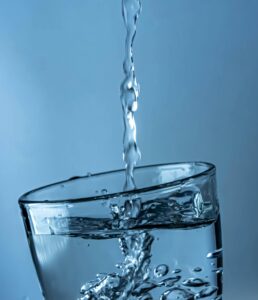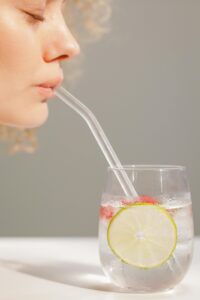Water is life — a true foundation of good health, proper nutrition, and physical performance. Yet, despite its importance, many people overlook hydration in their health and fitness journey. While supplements, workout routines, and diets get most of the attention, hydration remains the most powerful and natural performance enhancer and healer.
Whether you’re striving to lose weight, build muscles, recover faster, or improve overall well-being, water is a non-negotiable requirement that your body needs every single day. In this article, we’ll take a close look at how water impacts your physical health, fitness goals, mental clarity, metabolism, and even skin health—with practical tips for maximizing its benefits.

Why Water Is Essential for the Human Body
More than 60% of the adult human body is made up of water. In fact:
- The brain is around 75% water
- The muscles—that you work so hard to grow—are 75% water
- Blood is roughly 83% water
- Even bones contain 22% water
This alone should highlight how crucial hydration is for every biological function.
Key functions of water in the body include:
- Maintaining body temperature through sweating and heat dissipation
- Supporting digestion and nutrient absorption
- Eliminating toxic waste via urine and feces
- Lubricating joints, reducing the risk of injuries
- Carrying oxygen and nutrients to cells
- Keeping skin and organs hydrated
Neglecting water intake affects multiple systems: from digestion and metabolism, to energy and immunity. A dehydrated body is like a poorly oiled machine — less efficient and prone to breakdowns.
Water and Weight Loss: A Calorie-Free Fat Burne
“If you’re asking ‘Can drinking water help with weight loss?’”
“ The answer is a resounding YES.
Here’s why water should be a central part of any weight management plan:
Suppresses Appetite Naturally
Many times, we confuse thirst with hunger. Drinking a glass of water before meals creates a sense of fullness, reducing overall calorie intake. In one study, participants who drank water before meals consumed 13% fewer calories.
Must Read: Psychological Benefits of Exercise

Increases Calorie Burning (Thermogenesis)
Drinking cold water slightly boosts your resting energy expenditure — thanks to the energy your body uses to bring it up to body temperature. This process improves metabolism up to 30% for 30–60 minutes after drinking water.
Flushes Out Fats and Toxins
Proper hydration enhances the kidneys’ ability to filter waste and burns fat more efficiently via a biological process called lipolysis, where fats are converted into energy.
Substitutes High-Calorie Beverages
Replacing sugary sodas or calorie-laden juices with water saves hundreds of calories per day.
Pro Tip: Drink 500ml (around 2 cups) of water 30 minutes before each meal to help reduce calorie intake and boost metabolism.
Hydration and Physical Fitness
Whether you are into cardio, strength training, or sports, hydration is critical for performance.
Benefits of water during exercise:
- Regulates body temperature
- Keeps muscles energized and oxygenated
- Prevents cramps, dizziness, and early fatigue
- Enhances mental focus during challenging sessions
- Accelerates post-workout recovery
During intense workouts, you lose fluids through sweat. If you don’t replace them, your strength, endurance, and recovery all suffer.
Here’s how to hydrate for workouts:
- 30 minutes before exercise: Drink 250–500ml
- Every 20-30 mins during exercise: Sip around 100–200ml
- After exercise: Replenish with at least 500–1000ml of water
Including electrolytes like sodium, potassium, and magnesium might be beneficial for prolonged, intense workouts.
Must Read: Top 10 Proven Benefits of Healthy Eating
Muscle Growth and Water: What’s the Connection?
Believe it or not, water isn’t just about avoiding cramps—it’s about growing muscles too!
- Hydrated muscles perform better under stress
- Water helps transport nutrients, including proteins and amino acids
- Improves anabolic processes, essential for muscle repair
- Prevents catabolism (muscle breakdown), which commonly happens in a dehydrated state
Muscle tissue is 75% water. If you’re dehydrated, you’re not just slowing recovery—you’re limiting potential gains.

Water’s Impact on Mental Health and Energy Levels
Hydration isn’t just physical—it has a direct effect on mental performance and emotional state.
Benefits for the brain:
- Improves focus, clarity, and alertness
- Reduces anxiety symptoms
- Helps with memory and cognition
- Prevents headaches and migraines
Even mild dehydration (1-2% loss in body weight from water) is enough to disturb mood, memory, and brain performance.
Must Read: Top 10 Best Supplements for Muscle Building
Water for Glowing Skin and Anti-Aging
If you spend on expensive serums but ignore hydration — you’re missing the secret to youthful skin. Water helps:
- Maintain skin elasticity and moisture
- Prevent acne and inflammation
- Flush toxins from the skin
- Maintain a natural glow and reduce fine lines
Water promotes blood flow to the skin, delivering oxygen and nutrients that enhance texture and tone. It’s the easiest anti-aging step you can take daily.
How Much Water Should You Drink Daily?
There’s no one-size-fits-all when it comes to water intake. Some general guidelines are:
| Group | Recommended Daily Intake |
|---|---|
| Adult Men | 3.7 liters (13 cups) |
| Adult Women | 2.7 liters (9 cups) |
Factors affecting hydration needs:
- Climate (more needed in hot or humid weather)
- Physical activity level
- Illness, fever, or infections
- Pregnancy or breastfeeding
Use hydration tracking apps to measure and steadily increase your daily intake.
Must Read: 12 Proven Ways to Lose Belly Fat Quickly
When to Drink Water for Maximum Health Benefits
Strategic timing is just as important as the quantity. Here’s when water helps the most:
| Time | Benefit |
|---|---|
| First thing in the morning | Boosts metabolism and flushes toxins |
| 30 mins before meals | Improves digestion, prevents overeating |
| During and after exercise | Replenishes energy and electrolytes |
| Before sleep | Maintains overnight hydration |
Avoid chugging too much during heavy meals – it may affect digestion.

Practical Tips to Stay Hydrated Every Day
- Carry a reusable water bottle everywhere
- Set hourly reminders to sip water
- Add fruit or herbs (like lemon, mint, or cucumber) for flavor
- Drink water before meals, not waiting for thirst
- Use hydration apps like Plant Nanny, WaterMinder, or MyFitnessPal
- Set daily water goals (via bottle markers or journals)
- Eat water-rich foods (cucumber, watermelon, oranges)
- Keep a glass by your bedside
- Create a fun hydration challenge on social media for accountability
Small habits can lead to major health improvements over time.
Must Read: 8 Morning Routine Habits That Will Change Your Life
Bottled, Tap, or Filtered – What’s the Best?
Depending on where you live, safe drinking water quality may differ. Here’s a guide:
| Type | Pros | Cons |
|---|---|---|
| Filtered Water | Removes contaminants | Initial cost of filter |
| RO Water | Purifies hard water | May remove useful minerals |
| Tap Water | Easily accessible | Risk of pollution, especially in cities |
| Bottled Water | Convenient | Expensive, not eco-friendly |
For daily use, filtered or mineral-enhanced water is highly recommended.
Final Thoughts: Prioritize Water, Prioritize Health
In the journey of achieving health and fitness, the simplest tools are often the most powerful. While people invest in fancy diets, supplements, and gym memberships, they overlook water — the original, natural, and essential health booster.
With zero calories, no side effects, and endless benefits, water supports:
- Weight loss
- Muscle function
- Skin glow
- Digestion
- Mental clarity
- Heart and kidney health
- Detoxification
No health plan is complete without proper hydration. It’s time to take your water intake seriously and make it the center of your fitness routine
“Thousands have lived without love, not one without water.” – W.H. Auden
Must Read: The 10 Best Vegan Meal Delivery Services in 2025
FAQs
Q1: Can I drink too much water?
Answer: Yes — while rare, overhydration can lead to a condition called hyponatremia, where sodium levels become dangerously low. Stick to recommended levels unless otherwise advised by a doctor. Drink water throughout the day, not too much all at once.
Q2: What are some signs that I’m dehydrated even if I’m not thirsty?
Answer: Common signs of dehydration include dry lips or skin, fatigue, headaches, dark-colored urine, dizziness, and muscle cramps. Don’t rely on thirst alone — if you’re seeing these symptoms, increase your water intake.
How much water do you drink daily — and is it really enough? Let us know in the comments below!”

Zain Ul Hassan is the founder of Zaha Fitness. He writes practical, research-backed articles on fitness, weight loss, and natural health. His goal is to help people live healthier lives using simple and effective tips.
